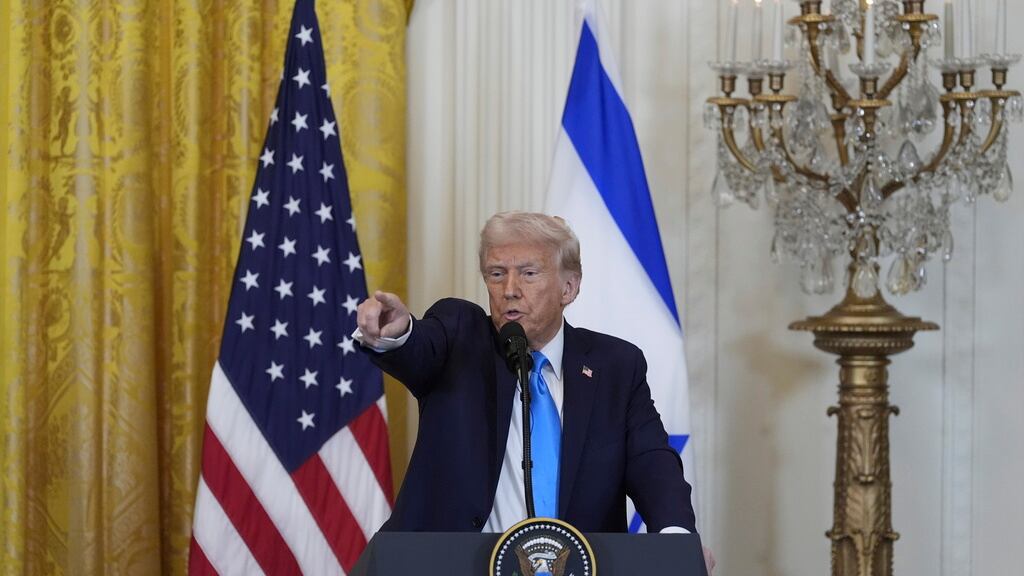The proposal of President Donald Trump for the United States to “take” the Gaza Strip and permanently relocate its Palestinian residents was quickly rejected and condemned on Wednesday by allies and adversaries of the United States alike around the world.
PUBLICIDAD
Trump raised the idea at a press conference at the White House with Israeli Prime Minister Benjamin Netanyahu, who smiled several times as the president outlined a plan to build new settlements for Palestinians outside the Gaza Strip, and for the United States to take "ownership" to turn the war-torn territory into the "Riviera of the Middle East".
PUBLICIDAD
"United States will take Gaza Strip, and we will also work on it," said Trump. "It will be ours as we will take care of dismantling all the dangerous unexploded bombs and other weapons on site, we will level the site, get rid of the destroyed buildings, flatten it, create an economic development that will provide an unlimited number of jobs."
What was the global reaction to Trump's idea about Gaza?
Egypt, Jordan, and other US allies in the Middle East have already rejected the idea of relocating more than two million Palestinians from Gaza to other locations in the region.
Saudi Arabia, an important American ally, quickly spoke out about Trump's general idea of taking over the Gaza Strip in a strong statement, and pointed out that Riyadh's continued request for the formation of an independent Palestinian state is a "firm, consistent, and unwavering position."
The Labour leader Keir Starmer, Prime Minister of Great Britain, expressed his first disagreement with the right-wing government of Donald Trump, stating in the House of Commons that the communities of Gaza "should be allowed to return home. They should be allowed to rebuild, and we must stand with them in that reconstruction on the path towards a two-state solution." The United Kingdom is the main political and military ally of the United States in Europe.
At the same time, the prime ministers of Australia and Ireland, the foreign ministers of China, New Zealand, and Germany, and a spokesperson for the Kremlin reiterated their support for a two-state solution.
Trump has already caused a stir—and upset old allies—when he suggested the purchase of Greenland, the annexation of Canada, and the possible takeover of the Panama Canal. At first, it was not clear whether the idea of taking over the Gaza Strip was a detailed plan or an initial move in negotiations.
"Last night's comments were, of course, very concerning," said Irish Prime Minister Micheál Martin. "When it comes to the government of the United States, I always take the approach of judging them based on what they do rather than what they say."
The French government stated that the "forced displacement" of around 1.8 million Palestinians "would constitute a serious violation of International Law" and "an attack on the legitimate aspirations of the Palestinians," according to a statement from the Ministry of Foreign Affairs.
The Palestinian president, Mahmoud Abbas, called on the United Nations to "protect the Palestinian people and their inalienable rights", saying that what Trump wants to do would be "a serious violation of international laws".
The proposal was also rejected by the Democrats.
In the United States, opposition politicians quickly rejected Trump's idea, and Democratic Senator Chris Coons described his comments as "offensive, crazy, dangerous, and foolish."
The idea "runs the risk of making the rest of the world think that we are an unbalanced and unreliable partner because our president is making foolish proposals," Coons said, pointing out the irony of the proposal shortly after Trump had maneuvered to dismantle the United States Agency for International Development.
Democratic representative Rashida Tlaib, a Palestinian-American congresswoman from Michigan, accused Trump in a social media post of "openly calling for ethnic cleansing" with the idea of resettling the entire population of Gaza.
